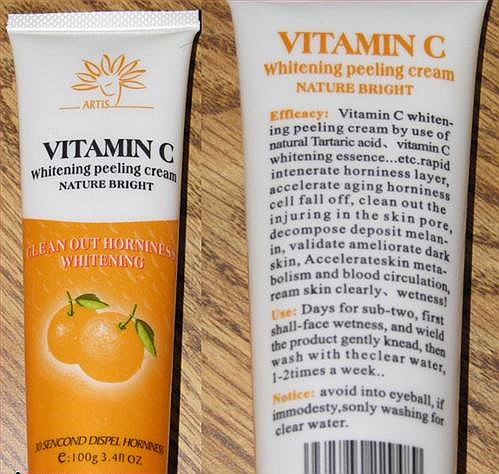6 - The State of Our EnglishSometime ago, my wife Leonor brought home something that took me off balance for a moment, then had me laughing in stitches for minutes. It was an imported product in a white polypropylene tube labeled “Glowing Skin Cream,” with this product claim right below it: “One Minutes Dispel Horniness.” I must admit that I had not displayed so great an ardor in such matters in recent years that my wife should want to curb it, nor that a glowing aspect was ever needed for such things, so I concluded offhand that the tube was a practical joke. But a practical joke it wasn’t, as evidenced by the apparently sober instructions that came right below the label, which I now quote verbatim: “USE: Days for sub-two,first shall face wetness, and weild then product gently knead, then with cleanly water washing. Notice: avoid into eyeball, if immodesty,shortly washing for cleanly water.”

Only after reading the instructions did it dawn on me that the product was for real; that it was, in fact, an honest-to-goodness skin-whitening cream; that by “horniness” it meant “roughness”; that “first shall face wetness, and weild then product gently knead” meant “wet the face first, then gently apply and rub the cream”; that by “Days for sub-two” it meant “during the first two days”; that “avoid into eyeball” meant “do not apply near the eyes”; and that “if immodesty,shortly washing for cleanly water” meant “if applied in excess, wash with clean water right away.” In short, the English I was reading was a literal, word-for-word translation of the original Chinese elsewhere on the tube. When I stopped laughing, I pondered how lucky Filipinos were for having been exposed to English usage for at least 100 years, thus making them incapable of committing such a linguistic atrocity.
Several months after that incident, however, I am no longer too sure if we Filipinos do have a firm hold on that century-long advantage. We may have made a quantum leap in the use of cellular telephony, and over 12 million of us may have already spread to practically every point of the globe, but in matters of English, we may in fact be backsliding to the point of writing the same English as that of the Chinese “horniness cream” ourselves. Consider these few unsettling examples of our current English usage:
(1) In the Ortigas Complex in Pasig City, inside some of the 180 men’s rooms of a twin-tower building there (and presumably inside some of the 180 women’s comfort rooms as well), is posted this sign: “Kindly flush the toilet after
used.” This misguided use of the noun-form “use” in the past tense (or maybe the past participle, who knows what the true grammatical intention was?)—done perhaps only because the word was preceded by “after”—must have made thousands of expatriate managers and foreign dignitaries squirm and think so low of us while perusing the bad English. Quite simply, of course, that sign should read: “Kindly flush the toilet after
use.” Here, “use” is a noun, not a verb.
(2) On the take-home boxes of a leading Philippine food chain is printed this baffling instruction: “Quality is Best / If Consumed Promptly / Upon Take-Out/Delivery.” Making statements elliptical to fit tight printing spaces is justifiable, of course, but not at the expense of logic and clarity. In the elliptical construction above, the reader clearly gets the wrong message that “quality can be consumed and should be consumed promptly.” And even from a purely product assurance standpoint, the “quality is best” claim is itself doubtful; if ever, quality would be “best” at source, and would start to deteriorate the moment the product leaves that source. The problem here arose because the instruction writer mistook “quality” as the subject, not the product itself. If he didn’t, he could have put the instruction the good, old, clear elliptical way—without the thoughtless rhetorical flourish that often puts advertising copy in trouble: “Best If Consumed Promptly / Upon Take-Out/Delivery.”
(3) On the obverse side of the pre-paid plastic card of a Manila-based Internet service provider is this statement: “Credits loaded on this card cannot be
exchange for cash.” Only last week, an irate Englishman sent me e-mail from the United Kingdom berating me for advocating the use of correct American English, saying: “I have been reading your columns with much amusement for quite some time and have often wondered how you thought you were going to educate people by your constant ramblings about items as the ‘past participle’ and other grammatical idiosyncrasies.” Well, I offer the stark error in using the verb-stem “exchange” in that Internet card as further justification for my constant ramblings about the past participle. That statement does need the past participle to cease to be an embarrassment in the Internet Age: “Credits loaded on this card cannot be
exchanged for cash.”
Enough said about the state of our English for now.
(December 18, 2003)